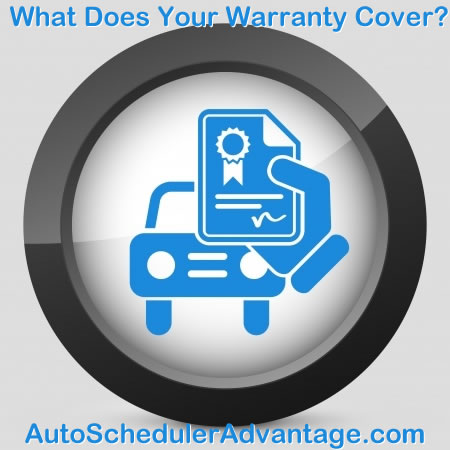 When you buy a new car, it will probably come with a warranty covering parts and service if something breaks down in your vehicle. A car's warranty is essentially an insurance policy covering your car, but it is also a binding contract between you the buyer and the manufacturer of your new car. The agreement has parts that need to be fulfilled by both the buyer and the manufacturer in order for the warranty to be valid.
When you buy a new car, it will probably come with a warranty covering parts and service if something breaks down in your vehicle. A car's warranty is essentially an insurance policy covering your car, but it is also a binding contract between you the buyer and the manufacturer of your new car. The agreement has parts that need to be fulfilled by both the buyer and the manufacturer in order for the warranty to be valid.
There are two main types of manufacturer's warranties. They are:
Basic or Bumper-to-Bumper
Power Train
What is Covered with a Bumper-to-Bumper Warranty?
A bumper-to-bumper warranty, also called a basic warranty, covers everything that is not considered wear and tear. Wear and tear would be items such as windshield wiper blades, tires, brakepads, filters and hoses, unless they were to malfunction because of how they were manufactured. For instance, if a tire were to suddenly give out because of how it was made or if a hose were to burst because it was made incorrectly, then those items would be covered. However, if they were to wear out over time, they would then not be covered by the bumper-to-bumper warranty.
What is Covered with a Power Train Warranty?
The power train warranty covers those parts that are responsible for helping the car to move. That would include the engine, transmission, driveshaft and the axles. If those parts were to malfunction, the warranty would include the parts and the cost of installation for them.
Both the power train and basic warranty are generally covered for 3 years or 36,000 miles. Some automobile manufacturer's offer warranties that cover more years or mileage, but the 3 years or 36,000 miles is fairly standard within the industry.
Buyer Obligations
Whenever you have a manufacturer's warranty on your car, you have obligations that need to be fulfilled for the warranty to be valid. Those obligations may include taking your car only to the service center at the dealership, or another certified dealership for the brand of car you purchased, in order for the warranty to remain valid. Taking your car to another mechanic can invalidate your warranty, even if it is just for an oil change. Read your obligations for the warranty carefully so you don't invalidate the warranty and get stuck with a large repair bill if something were to malfunction on your car.
Extended Warranties
You have the option of also getting an extended warranty to cover the cover after the manufacturer's warranty expires. They may purchase it when they purchase their car or they may get an offer prior to the manufacturer's warranty expiring. Some extended warranties may cover items that the original manufacturer's warranty didn't, including wear and tear, roadside service or travel reimbursement.
Before you commit to an extended warranty, you should go over your options and see if the price of the warranty is with it to you. If you're purchasing a car known for reliability, the extended warranty could be a waste of money.